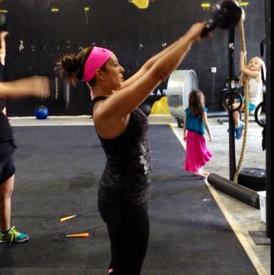I NEED SOME RUNNER ADVICE

annam25
Posts: 68 Member
So just started running a few week ago, and my calves started hurting while I was running, not after-- just during my run. I have Vibram 5 fingers, and I know they are supposed to workout different muscles and when I bought them they told me I would be sore from running in them for a while. But I have ran in these shoes before and my calves never hurt. So the question is, is it my shoes? Do I have weak calves? Am I trying to run to fast for a beginner? Should I keep running? I feel like I could run for hours, but my calves are holding me back... Help! lol I'm training for my first 5k so I need to keep running.
0
Replies
-
It's my understanding that since you're running more on the ball of your foot, it takes a while for your calves to get used to being worked that hard. I'm making the transition from traditional running shoes to more minimalist shoes, and since buying a pair that's not even total minimalist, just has a lower drop, I've noticed a bit of soreness in my calves. Try foam rolling your calves after a run and then when you get up the next morning, and popping a couple ibuprofen right before a run. That should reduce inflammation.
And adding in some good strength training for those calves (calf raises are the first thing that comes to mind) can't hurt either 0
0 -
Everyone is different so any of the reasons you gave could be the problem, or even a variety of them.
I know when I had calf muscles issues, it happened during the training for my first half marathon. I strained the calf muscle and after talking with quite a few runners and doing some research online, I figured out I wasn't stretching the calf muscles enough after running. Once I rested and got over the injury, I started doing more and different stretches after running and haven't had any problems since.
Since running is such a personal, independent thing, it can be difficult to pinpoint the exact cause of the pain. I know... not much help! But try running a bit slower or in different shoes and see if you can pinpoint the cause. Good luck -- and hope the pain goes away soon! :flowerforyou:0 -
I've been running in vibrams for over a year. Sore calves are normal for a while when switching to minimalist shoes because since people wear shoes all the time and all shoes have heels at least an inch high, their calves and achilles tendons are unnaturally shortened. It takes a while for them to strech back to their normal length. Also, since you are no longer running on your heels your calves are now working as they are designed.
It took me around five months before calf soreness was no longer an issue. Keep running in the vibrams and the calf sorenoess will eventually go away. In the meantime be careful not to pull a calf muscle. (I did that twice)0 -
I had a very similar problem with my old shoes so i went to a special running store and got the to do a runners test on me ( u get on the tredmill start running and it checks the way you run etc) and i got proper running shoes to fit and running socks always help me ....Do u make sure u stretch befor you run and afterwards ? an the instant start of a run may cause this pain
i started running In Jan for the first time in a very long time and did a half marathon last month ...its a great feeling, just keep going and go at your own pace xx0 -
THANK YOU ALL SOOOO MUCH!
 Mwah! 0
Mwah! 0 -
Do not pop ibuprofen before running, particularly if you are ever going to distance run. Elite runners have died from kidney failure (hyponatremia) during endurance competitions because ibuprofen and other NSAIDs can alter normal kidney function. If you have pain, either don't run until it resolves to minimize tearing your muscles or ligaments, and/or take acetaminophen (Tylenol) before you run as an analgesic. Runners should not take ibuprofen within 4-6 hours of completing a long run, but after that amount of time, it can significantly help with swelling. I realize you are just training for a 5k, but better to start good habits now.
As far as the shoes go, pain is not encouraging for running. I personally have no interest in Vibrams-I know what works for my body and I don't see the point in changing that. When anything starts hurting during my regular running, the first thing I question is my shoes and I replace them frequently which almost always solves the problem whether it's my ankles, knees, hips, feet, etc.0 -
Do not pop ibuprofen before running, particularly if you are ever going to distance run. Elite runners have died from kidney failure (hyponatremia) during endurance competitions because ibuprofen and other NSAIDs can alter normal kidney function. If you have pain, either don't run until it resolves to minimize tearing your muscles or ligaments, and/or take acetaminophen (Tylenol) before you run as an analgesic. Runners should not take ibuprofen within 4-6 hours of completing a long run, but after that amount of time, it can significantly help with swelling. I realize you are just training for a 5k, but better to start good habits now.
This!!
This topic came up recently on my triathlon group message board and this was exactly what the head of the group said. He and his wife are both doctors.
It was once thought it would help with inflammation during the run but studies have shown it does not and it can cause other issues.
As for the calf pain, pretty sure everyone covered that already. I haven't used vibrams but I understand that is common when starting with them.0 -
Eat a banana daily...that helps me
 also, go see someone about getting proper shoes
also, go see someone about getting proper shoes  0
0 -
Do not pop ibuprofen before running, particularly if you are ever going to distance run. Elite runners have died from kidney failure (hyponatremia) during endurance competitions because ibuprofen and other NSAIDs can alter normal kidney function.
Name one.
Also, kidney failure resulting from NSAIDS is not the same thing as Hyponatremia. The former is the kidney's failure to clear toxins, the latter is diminished sodium balance which can be caused by over-hydrating and not taking in enough sodium.
Edit: spelling0 -
You are right kidney failure can be a result of hyponatremia. I misstated that and stand corrected. Hyponatremia can be induced by NSAIDs and it can also be induced by excessive water or other liquid consumption. The mix can be especially deadly. Hyponatremia itself may be nonsymptomatic or may present with muscle cramping, diarrhea, lightheadedness, etc.. Here's one of several journal articles that finds that " runners using any NSAID were more likely to become hyponatremic.": Exercise-Associated Hyponatremia, Renal Function, and Nonsteroidal Antiinflammatory Drug Use in an Ultraendurance Mountain Run (Page et al, 2007, Clinical Journal of Sport Medicine, Issue: Volume 17(1), January 2007, pp 43-48).
For a less clinical discussion regarding this subject, this is a great article that a friend sent to me before my first marathon when i was considering Advil-popping before the race: http://www.runnersworld.com/article/1,7120,s6-241-286-289-7770-0,00.html. Also, the New York Times has written about hyponatremia among distance runners. You can find people who have died from things such as hyponatremic encephalopathy by googling them, such as Cynthia Lucero during the 2002 Boston marathon.
In summary, dysnatremia (which can be hypo- or hypernatremia, neither of which is good) is found to occur in ~30% of collapsed marathon runners. Since NSAIDs can increase the risk, why go there?0 -
You are right kidney failure can be a result of hyponatremia. I misstated that and stand corrected. Hyponatremia can be induced by NSAIDs and it can also be induced by excessive water or other liquid consumption. The mix can be especially deadly. Hyponatremia itself may be nonsymptomatic or may present with muscle cramping, diarrhea, lightheadedness, etc.. Here's one of several journal articles that finds that " runners using any NSAID were more likely to become hyponatremic.": Exercise-Associated Hyponatremia, Renal Function, and Nonsteroidal Antiinflammatory Drug Use in an Ultraendurance Mountain Run (Page et al, 2007, Clinical Journal of Sport Medicine, Issue: Volume 17(1), January 2007, pp 43-48).
For a less clinical discussion regarding this subject, this is a great article that a friend sent to me before my first marathon when i was considering Advil-popping before the race: http://www.runnersworld.com/article/1,7120,s6-241-286-289-7770-0,00.html. Also, the New York Times has written about hyponatremia among distance runners. You can find people who have died from things such as hyponatremic encephalopathy by googling them, such as Cynthia Lucero during the 2002 Boston marathon.
In summary, dysnatremia (which can be hypo- or hypernatremia, neither of which is good) is found to occur in ~30% of collapsed marathon runners. Since NSAIDs can increase the risk, why go there?
I agree with what you stated here and I am aware of the risk stated in the articles you posted (thanks for taking the time to research them and post them). I was questioning that there was direct evidence of a distance runner that had died in a race and the cause found by autopsy was "renal failure due to NSAID ingestion".
I don't deny that it increases the risk and it's not one worth taking.0
This discussion has been closed.
Categories
- All Categories
- 1.4M Health, Wellness and Goals
- 398.2K Introduce Yourself
- 44.7K Getting Started
- 261K Health and Weight Loss
- 176.4K Food and Nutrition
- 47.7K Recipes
- 233K Fitness and Exercise
- 462 Sleep, Mindfulness and Overall Wellness
- 6.5K Goal: Maintaining Weight
- 8.7K Goal: Gaining Weight and Body Building
- 153.5K Motivation and Support
- 8.4K Challenges
- 1.4K Debate Club
- 96.5K Chit-Chat
- 2.6K Fun and Games
- 4.8K MyFitnessPal Information
- 12 News and Announcements
- 21 MyFitnessPal Academy
- 1.5K Feature Suggestions and Ideas
- 3.2K MyFitnessPal Tech Support Questions





